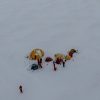Shattered glass in a bomb-damaged store front in Stepanakert
Credit: Julian Simmonds
Azerbaijan has been dropping cluster munitions in civilian areas during its war with Armenian forces in the breakaway republic of Nagorno Karabakh.
The munitions, which scatter tiny bomblets over a wide area, are banned under a global treaty because of the risk they pose to civilians, especially children.
But the Daily Telegraph saw them being used during heavy shelling this weekend in the city of Stepanakert, the capital of Nagorno Karabakh.
On a downtown street full of shops and housing blocks, large quantities of the bomblets — small cylindrical tubes about the size of a film can — were left scattered on the concrete. Several had failed to explode, posing an ongoing risk to passers-by. The bomblets are considered a particular hazard to children, who often mistake them for toys and pick them up.
The munitions were dropped during an escalating bombing campaign across Nagorno Karabakh, which broke away from Azerbaijan after a bloody civil war in the early 1990s that saw 30,000 people killed.
An unexploded cluster bomb in central Stepanakert in Nagorno-Karabakh
Credit: Julian Simmonds
Neither Azerbaijan nor Armenia has signed the international Convention on Cluster Munitions, which came into force in 2010 and already has 109 signatories, including Britain. Both Azerbaijan and Armenia have accused each other of using the weapons in the past.
Tim Ripley, a defence analyst and writer for Jane’s Defence Weekly magazine, told The Telegraph that the cluster bombs appeared to be M85 sub-munitions. Based on a US design, they are produced in both Israel and Turkey, which supply Azerbaijan with weapons. The weapons are sometimes deployed against tank formations, the bomblets being used to target weak points in tanks’ armour.
“We can’t be certain why these were in use or what exactly they were being aimed at, but any kind of cluster munition being used in an urban area opens the possibility of civilians being inadvertently killed or injured,” he said.
The conflict, which is now in eighth day, intensified over the last two days, with both sides claiming that the other is deliberately shelling civilian areas. Azerbaijan said on Monday that Armenian forces were hitting the city of Ganja, with a population over 330,000, and Agjabedi, home to some 38,000, as several other towns.
Shelling also continued in Nagorno Karabakh on Monday in Stepanakert and the nearby town of Shushi, where The Telegraph saw bodies of policemen being removed from a missile-hit city centre building.
In Stepanakert, shopkeeper Aramayis Gasparyan, 56, said he was lucky to be alive after a missile that struck a house next to his premises on Sunday left a 20 foot crater in the ground.
“I missed it by about two minutes,” he said, surveying the wreckage. “I was out buying supplies at the market and stopped to have a quick glass of vodka with one of the traders — if I hadn’t done I would have got home just as it landed.”
The two sides have reported 266 deaths since the fighting erupted, including more than 40 civilians, but the real total is expected to be much higher as both sides are claiming to have inflicted heavy military casualties.
Most of the confirmed deaths are from Karabakh’s separatist forces, who have reported more than 220 fatalities including 21 more on Monday. Azerbaijan has not released any figures for military losses.
Diplomat efforts to resolve the conflict have so far failed, with the Azerbaijani president, Ilham Aliev, insisting that Armenia must pull its troops out of Nagorno Karabakh before any talks can start. The territory is still recognised internationally as part of Azerbaijan, which claims its people were ethnically cleansed from the area during the 1988-94 war.
Nato member Turkey, which has been openly supporting Azerbaijan’s efforts to reclaim Nagorno Karabakh, was warned by the organisation on Monday to take a more constructive approach.
The Nato Secretary General, Jens Stoltenberg, called on Ankara to use its “considerable influence” with Azerbaijan to calm the conflict. However, the Turkish Foreign Minister Mevlut Cavusoglu, said Nato should concentrate pressure on Armenia to withdraw its forces.
“Everyone, and especially NATO, must make a call for Armenia to withdraw from these territories, in line with international laws, U.N. Security Council resolutions and Azerbaijan’s territorial and border integrity,” he said.























































Свежие комментарии